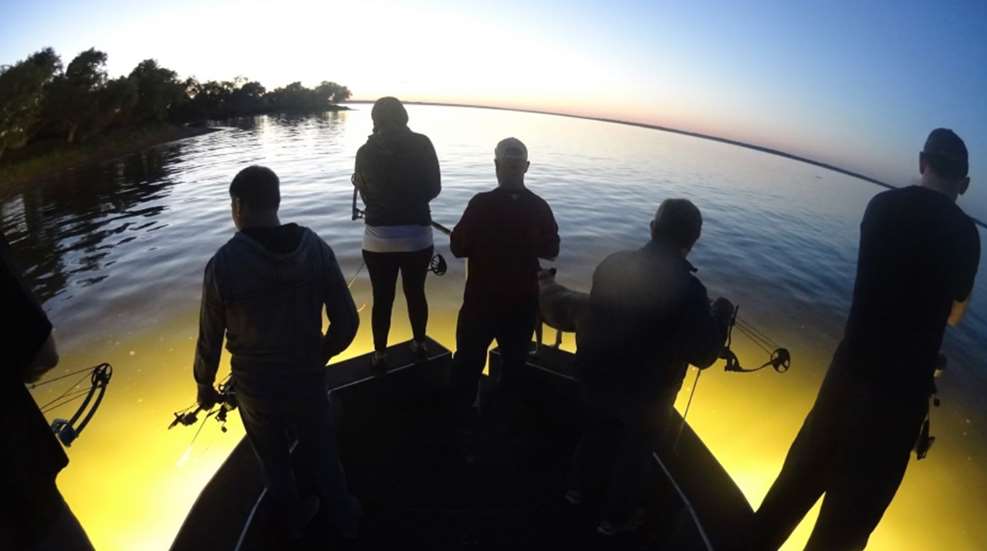
Keeping your hunting skills honed between seasons can be difficult. Most individuals wait until right before hunting season to start dusting off rifles, bows and other things taken to the field. These same individuals wait to brush up on their hunting skills that they have not used since last season. These skills include shooting, silently stalking game, and other things used for a successful hunt. I found the perfect solution for hunting year-round and keeping my skills honed between seasons—bowfishing!

Bowfishing is hunting for fish! The gear used are bows and arrows. The bows have a special attachment the serves as a reel. The line from the reel is attached to a special arrow used for impaling fish. You can join in this activity, which is usually legal year-round for non-game fish, depending on your location. These fish are called rough fish and include, but not limited to, carp, gar, buffalo and gasper goo.
Bowfishing can be done from a boat or by carefully stalking rough fish from the shoreline. Either way, stealth and clever movement along the haunts of these often-over-looked targets is the formula for a successful hunt. Many rough fish can be found in slow moving or stagnant water that has a very low to almost non-existent oxygen saturation. Rough fish have gills like other fish to obtain oxygen out of the water, but water with little or no oxygen can prove fatal to the fish. Because of this, many of these species must come to the surface and gulp air or at least suck in the more oxygenated water on the surface. Fish such as carp and buffalo will come to the surface to take in water at the surface to obtain the most oxygen. Gar have a primitive vascular lung system that allow them to “breath air.”

Gar and other rough fish could “drown” or die from lack of oxygen if they were not able to get the oxygen needed for their survival by gulping air or surface water in low oxygenated areas. The is the rough fishes Achilles heel. This is when the hunter’s skills are put to the test. Once an area is located that has surface activity, the bow fisherman must quietly approach undetected either by boat or foot. When the fish comes to the surface to get the oxygen they need, the bow fisherman sends the special arrow through the water to impale the unsuspecting prey.
I decided to test my skills against these pre-historic animals. I contacted Bowfishing guide Marty McIntyre, owner and head guide of Garquest Bowfishing Adventures:
A proud army veteran with more than 20 years of service to our country, Marty has bowfished for over 30 years and guided thousands of fishermen since he started his business in 1996. His largest gar to date is an alligator gar topping the scales at 174 lbs. and 7’ 4” in length. Marty also holds the current Texas state record for Big Mouth Buffalo taken by one of his bowfishing adventures, weighing in at 81.5 lbs.

Marty informed me that we will bowfishing after dark for “rough” fish. Rough fish include our target species of carp, gar, buffalo and gasper goo. With Marty having all the necessary gear, all I needed to do was grab my fishing license and meet him at the boat ramp on an East Texas Lake.

Four other adventurous women and I met Marty and his tricked-out bowfishing vessel at the boat ramp at dusk. There was an eeriness as wildlife started settling in for the night, and the nighttime critters stated stirring. As I stared at the boat rigged with spotlights, bow racks, and the perimeter of the boat where we would be shooting off the platform, I heard Marty say we are heading out on a three-hour tour, and I was hoping our upcoming adventure wouldn’t leave us stranded on an island with Gilligan too!
Marty showed us all the equipment we would be using: A compound bow with a reel attached where the stabilizer is usually located, followed by a demonstration of how the special bowfishing arrows are attached to the line from the reel. He guided us to the best place to stand on the platform at the edge of the boat. We would be in shallow water the majority of the time, and would slowly work the shoreline for any of our targeted species.

As we left the dock, easing through the shallows, the usual nighttime sights and sounds took over. When we cleared the dock and headed into the darkness, reaching the prime fishing area, Marty flipped the switches, and the spotlights came on, and we worked the shoreline with the lights shining into the shallow depths.
We heard frogs croaking, flapping of wings from unseen birds, and splashes in the water from the several families of nutria playing and feeding on aquatic plants along the shoreline during the night. As we worked the shoreline, lights shining into the shallows, shimmering torpedo-like fish slowly snaked through water. Marty pointed out that these objects we were seeing were gar. All four species of gar: alligator, spotted, shortnose, and longnose, inhabited the lake in which we were fishing. We were so distracted by the nightlife in and around the water, we were shortly interrupted by our Guide Marty hollering, “Oooh oooh—there’s a big one! Shoot! Shoot!”

Once our eyes adjusted to the forms of our targets, we could pick out our fish. The rest of the evening was filled with sounds from each of us bursting into a series of “oooh, oooh!” when one of us spotted a fish. Whoever was closest to the target would quickly draw the bow back and release, asking “Did I get it?” Marty was chuckling behind us as he puttered the boat around saying “miss” or “over.” The swish of one or two more arrow sailing through the air and the sound of the arrows striking the water drowned out our laughter, as the other ladies in our group tried to chase after the fish that was just missed! Finally, I connected and heard Marty holler “you got it!” I reeled in a beautiful 30” spotted gar! By the time we were through, we landed several fish.
One of the most challenging aspects of bowfishing is to learn to adjust for refraction, or the bending of light as it passes through water. What looks like a perfect shot on target actually results in a big miss! One of the tricks is to learn how to shoot “under” the fish for a successful hit.
I never thought “hunting” fish would be so much fun! The whole experience was something I will never forget. This should be on everyone’s bucket list. It is great practice for the upcoming hunting season, a new twist to fishing, and a new way to enjoy the great outdoors with your family and friends!














































